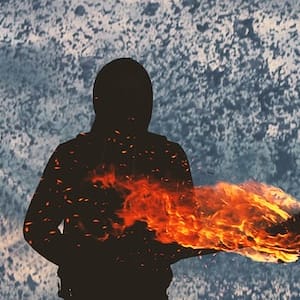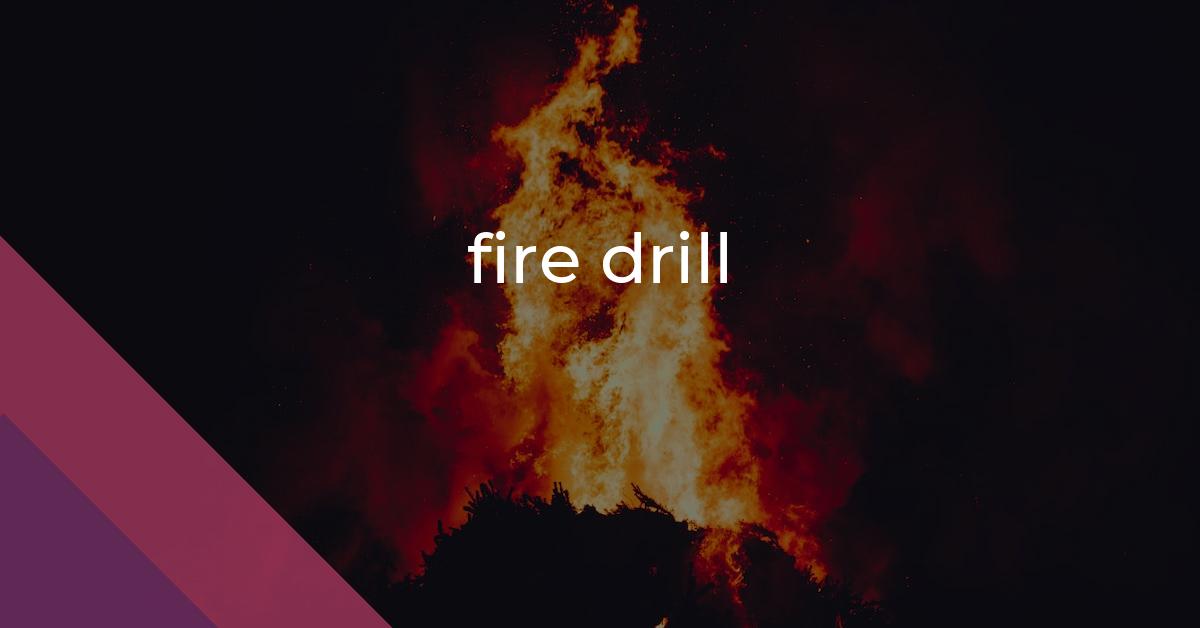fire drill: Idiom Meaning and Origin
What does ‘fire drill’ mean?
The idiom "fire drill" refers to a situation that is chaotic, hurried, or rushed, often with little or no prior planning. It is typically used to describe a scenario where people are scrambling or going through motions without clear direction or purpose, much like how individuals would in a real fire drill.

Idiom Explorer
An idiom referring to a situation or event that appears to be chaotic, disorganized, or confusing.
The idiom "last minute" refers to the final moments before a deadline or event. It suggests that something is done or happens with very little time or notice remaining, often causing rushed or stressful situations.
When someone says "know the drill," it means that they are reminding you to follow a familiar routine or procedure that you are already familiar with.
The idiom "kick bollocks scramble" refers to a chaotic and disorganized situation caused by a sudden disturbance or act of aggression. The imagery of the idiom emphasizes the disruptive and disorderly nature of the event.
The idiom "irons in the fire" means having multiple projects or tasks in progress or pursuing multiple opportunities at the same time. It suggests being busy with various things and being proactive in pursuing new prospects or ventures.
An idiom meaning to do something quickly and efficiently, often describing the completion of multiple tasks or actions in a single swift and decisive motion.
An idiom used to describe someone who is in an emotional or mental state of extreme agitation, distress, or confusion.
The idiom "in a flash" means doing something very quickly or almost instantly.
The idiom "hit the fan" is used to describe a situation where something goes terribly wrong or chaotic, often as a result of a secret or scandal being revealed. It implies a sudden and explosive response to the situation.
The idiom "hair-on-fire" is used to describe a state of extreme panic or urgency, often caused by a dangerous or urgent situation. It implies a sense of being in a state of panic or chaos, similar to having one's hair literally on fire.
Decoding Fire Drills
The idiom "fire drill" has its origins in the practice of conducting emergency drills in schools and workplaces. During a fire drill, people swiftly evacuate a building in response to a simulated emergency. This idiom is often used to describe a situation where there is a sudden and chaotic rush of activity or a disruptive event that requires immediate attention.
One interesting related idiom is "Mexican breakfast." Just as a fire drill involves quick action, a Mexican breakfast can refer to a fast-paced start to the day. It implies efficiency and urgency, much like a fire drill.
Another related idiom is "fight fires." This phrase describes the act of addressing and resolving urgent problems as they arise, similar to how a fire drill prepares individuals to respond quickly in an emergency. When you fight fires, you tackle issues head-on without delay.
The idiom "fire hose" can also be related to a fire drill. A fire hose is a powerful tool used to extinguish flames, and it requires skilled handling to control its force. Similarly, a fire drill prepares individuals to effectively respond to a crisis with promptness and composure.
Lastly, the idiom "escape fire" can be associated with a fire drill. "Escape fire" refers to a small controlled fire set intentionally to create a path of safety by eliminating combustible material. Just as an escape fire provides a way to safety, a fire drill trains individuals to find the best routes for evacuation during a real fire.
It is worth noting that the idiom "fire drill" is often used in a negative or critical sense, highlighting the disruptive and frenzied nature of the situation being described. It is commonly used in the context of work or school, where unexpected or urgent tasks arise and cause chaos and distraction. The idiom captures the sense of urgency and chaos associated with both a fire drill and a Mexican breakfast.
Furthermore, the idiom "fire drill" can also be used to describe a situation that may not necessarily be urgent or important but is treated as such due to a perceived need for immediate action. In this sense, it conveys a sense of unnecessary panic or hyperactivity. It mirrors the idea of fighting fires, where urgent response is required even if the situation may not warrant it.
An interesting aspect of the idiom "fire drill" is its ability to capture the collective sense of urgency and the need for coordinated action. It emphasizes the importance of individuals quickly responding and adapting to unforeseen circumstances, similar to the way people evacuate in a fire drill.
Overall, the idiom "fire drill" is a metaphorical expression that originates from the literal practice of conducting emergency drills. It conveys a sense of sudden chaos, disruption, and the need for immediate action. While its exact origin remains unclear, it has become firmly established in US English and is commonly used to describe a variety of situations where there is a rush of activity or the need for swift response. The idiom captures the urgency and collective effort required in such situations, leaving room for further exploration and application in different contexts. Just like the idioms "Mexican breakfast," "fight fires," "fire hose," and "escape fire" are related to the concept of a fire drill, they further emphasize the sense of urgency and action that this idiom signifies.
Example usage
Examples of how the idiom "fire drill" can be used:
- During the staff meeting, the manager suddenly announced that there would be a fire drill later that day.
- The students were lined up outside their classrooms, waiting for the fire drill to begin.
- When the fire alarm went off unexpectedly, everyone in the building had to evacuate as if it were a real fire drill.
More "Emergency" idioms



